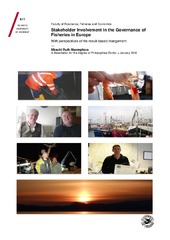Stakeholder Involvement in the Governance of Fisheries in Europe: With perspectives of the result-based management
Permanent link
https://hdl.handle.net/10037/9619View/
Thesis introduction (PDF)
Paper 1. Msomphora, M.R., Aanesen, M.:(2015). "Is the catch quota management (CQM) mechanism attractive to fishers? Preliminary analysis of the Danish 2011 CQM trial project." Also available in Marine Policy 58 (August): 78 – 87 (PDF)
Paper 2. Msomphora, M.R.: "Stakeholder participation and satisfaction in the process of developing management plans: The case of Scottish Inshore Fisheries Groups." Also available in Ocean & Coastal Management 116 (November): 491-503 (PDF)
Paper 4. Msomphora, M.R.: "The role of science in fisheries management in Europe: From Mode 1 to Mode 2." Also available in Maritime studies 15(3). (PDF)
Date
2016-05-27Type
Doctoral thesisDoktorgradsavhandling
Author
Msomphora, Mbachi RuthAbstract
The PhD project study is about ‘stakeholder participation’ in fisheries governance; a concept that has become acceptable in all areas of decision-making during the last few decades, partly due to dissatisfaction with the performance of fisheries management systems across the world. Among other issues, discarding, especially of marketable fish, is a serious and continuing problem despite the heavy emphasis on conservation policies. The absence of responsibility for industry and stakeholder groups is evidenced as the main reason for the problem. In this regard, authors in this field expect that a fisheries governance that entails sharing management responsibilities between the authorities and the resource users i.e. ‘co-management’ and more recently ‘results-based management’ (RBM) will result into developing a positive feedback loop.
The purpose of this study is therefore to establish a theoretical framework on how and to what extent the stakeholders can efficaciously be involved in the management of fisheries, within the perspectives of RBM. This central topic is explored through four papers: Paper 1 discusses how the proposed discard-reduction management mechanism, i.e. Catch Quota Management (CQM) strategy, may be formulated in order to attract fishers’ participation and to make it profitable for them to comply with the rules. Paper 2 explores the association between stakeholder levels of participation and satisfaction in the decision-making process for the development and implementation of the fisheries management plan (MP). This issue is also discussed in paper 3, but in light of exploring the important fisheries conditions for success in stakeholder participation. Lastly, paper 4 demonstrates what the stakeholder involvement in scientific knowledge-production of policy-making may imply for the fisheries science community, but also illustrating how science with the incorporation of all stakeholders may be practised to provide valuable knowledge for policy-making without compromising the ethos of science as an institution.
Description
Paper 3 of this thesis is not available in Munin:
Paper 3. Msomphora, M.R.: Conflict resolution and the delegation of authority in fisheries management: The case of Outer Hebrides Inshore Fisheries Group in Scotland. (Manuscript).
Paper 3. Msomphora, M.R.: Conflict resolution and the delegation of authority in fisheries management: The case of Outer Hebrides Inshore Fisheries Group in Scotland. (Manuscript).
Publisher
UiT The Arctic University of NorwayUiT Norges arktiske universitet
Metadata
Show full item recordCollections
Copyright 2016 The Author(s)
The following license file are associated with this item:


 English
English norsk
norsk
